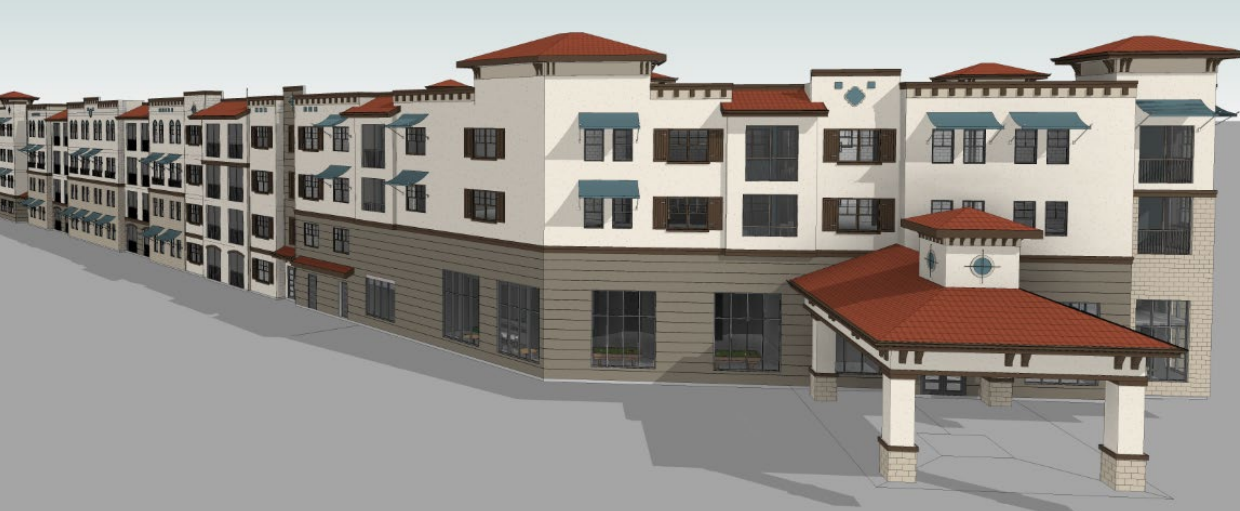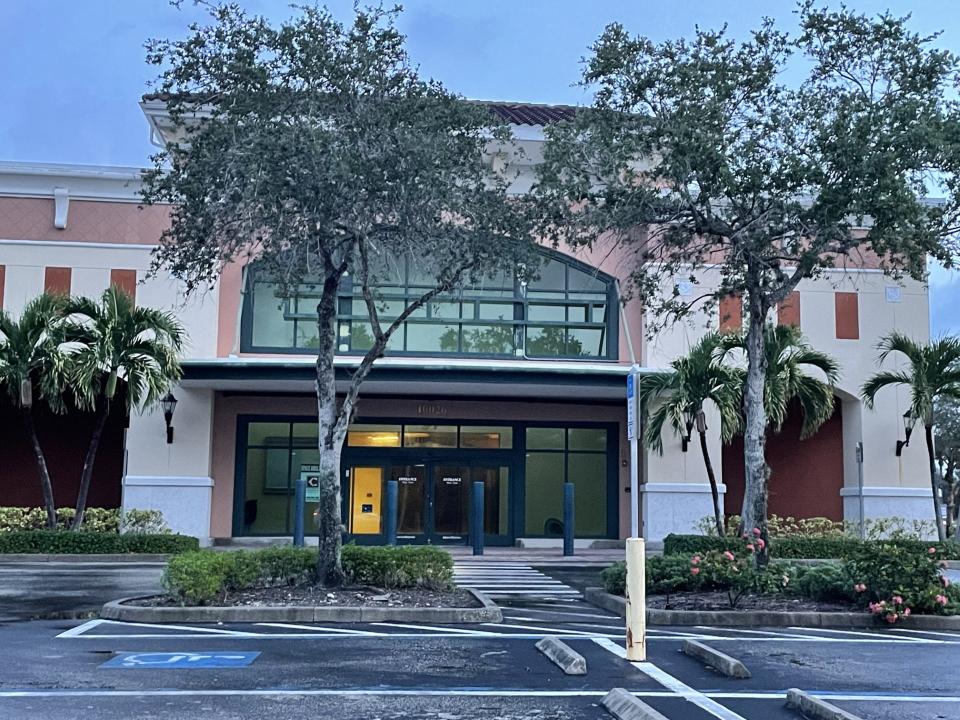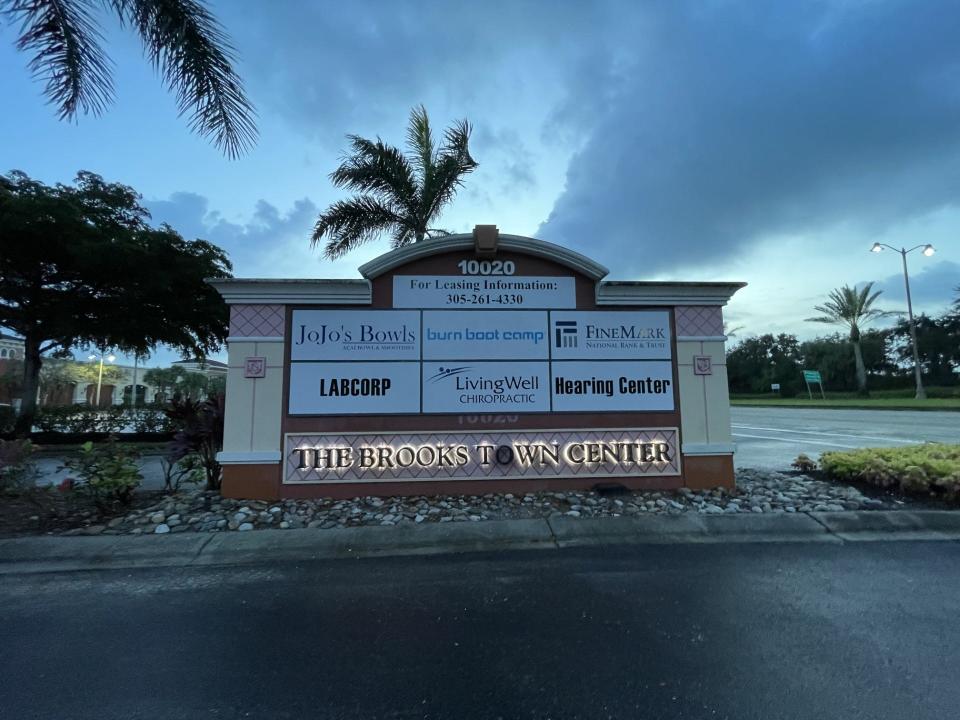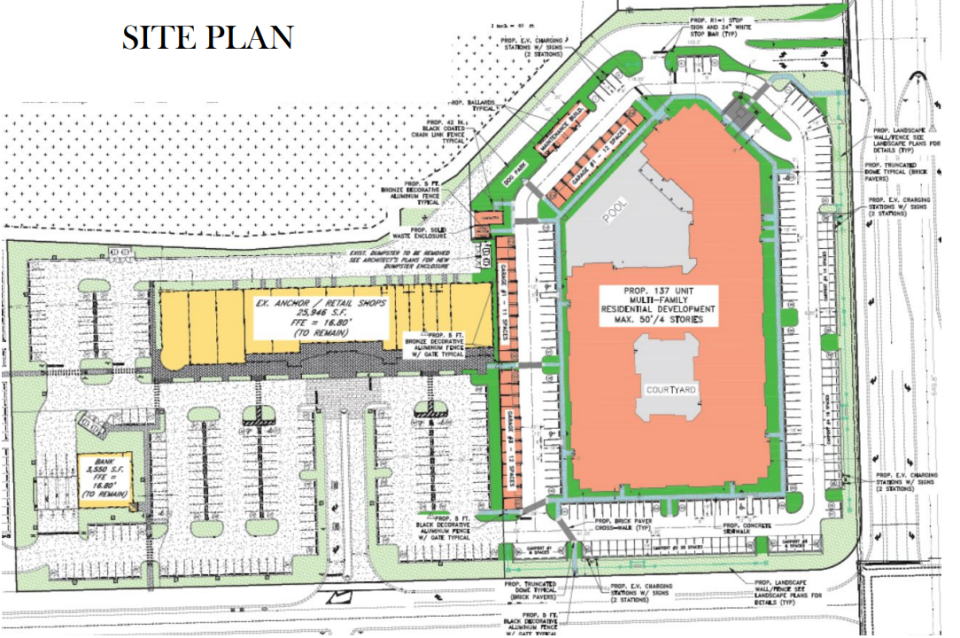Apartments to replace old Winn-Dixie store in Estero get final approval of site plan

A former Winn-Dixie store will be no more in Estero.
On Tuesday, a developer won final approval to tear it down to make way for apartments at the northwest corner of Coconut Road and Three Oaks Parkway.
The long-vacant store at The Brooks Town Center will be demolished, and replaced with a four-story luxury apartment complex, with 137 units, at a height of 50 feet.
The village's Planning, Zoning & Design Board approved the development order ‒ or site plan – by a vote of 5-2, despite strong opposition from neighbors.
The decision came after more than three and a half hours of discussions, presentations and testimony.
With one-last minute revision, Barry Jones moved to approve the plan. It was seconded by member Kristin Jeannin, who liked the change.
To address parking concerns raised by neighboring businesses, Jones asked for 20 back-to-back spaces immediately in front of their storefronts to be strictly reserved for commercial uses, and not shared with the apartment community, as shown in the site plan.
He saw the stipulation as a way to ensure the businesses remained viable after "beating his head" for a solution.

Tom Cavanaugh, president and CEO of the PAC Land Development Co., the project's developer, didn't mind giving up the spots.
"Not a problem," he said. "I don't need 'em.'"
The upscale building will have garages, carports and surface parking.
Known formally as the Coconut Pointe Residences, the rental community will include a pool, a courtyard with an outdoor kitchen and dining area, and a dog park.
The developer, going under the name AC Estero Apartments LLC, received approval of a conceptual plan from the same board in July, as part of a two-step process required to obtain permits.
The final site plan included noticeable improvements to architectural features, lighting and landscaping, which exceeded code requirements.
"We have gone out of our way to try to upsize the landscaping," said Charlie Krebs, a vice president with Hole Montes Inc., an engineering firm and consultant on the project.
Decorative walls and benches will be added along Three Oaks Parkway and Coconut Road for visual appeal, and to mask the development.
Rents are expected to range from $2,500 to $5,000.
Earlier: Settlement struck to allow apartments in place of a former Winn-Dixie in Estero
More like this: Proposal to build apartments in a conservation area at Fiddler's Creek sparks concern, ire
The development didn't require a rezoning
The development did not require a rezoning, as a result of a negotiated settlement that the Village Council approved earlier this year.
In 1997, long before Estero incorporated, Lee County approved the zoning and a Development of Regional Impact for The Brooks, a 2,492-acre master-planned development. That zoning allows for various uses on the property at Town Center, including apartments.
Apartments will be built on about half of a nearly 10-acre site. With the exception of the old grocery store, the long-established shopping plaza will remain in place, along with a bank, to serve the surrounding neighborhood.
During the discussions, Mary Gibbs, the village's community development director, explained to the Planning, Zoning & Design Board that it wasn't there to consider the zoning, but rather to determine whether the site plan met land development and zoning regulations, and the terms of the settlement agreement.
"We believe that it does comply with the codes," she said. "We've analyzed it, pretty detailed."
In its analysis, staff also found the site plan to be consistent with the settlement.
Neighbors who opposed the apartment complex continued to argue it wouldn't be a good fit for the location. They raised concerns about the development's impacts on everything from wildlife and street views to traffic and property values.
"I can't believe we got to this point. I want to put out the word compatible, compatible, to every one of you. This project is not compatible to The Brooks. Period," said Ron Mishko, who lives in Lighthouse Bay, part of The Brooks.
He argued there weren't any other four-story buildings in the community. After he was told by a board member that one does in fact exist nearby, it didn't change his mind.
He lamented that the apartments would "change everything," and not in a good way.

Apartments faced opposition from residents, business owners
More than 1,500 residents from The Brooks signed a petition asking for denial of the site plan.
Brooks resident Kathy Wyrofsky, whose house will sit within 400 feet of the apartments, to the rear, sought "adversely affected party status," at the hearing, but it was denied ‒ twice.
First, the board voted to approve her request, which ended in a tie. A reverse motion then ended in a tie, with one member, who arrived late, absent.
The status would have given Wyrofsky more time to make a case against the development order before the board. She hoped to bring up a few experts she hired to bolster her arguments for denial, as part of a detailed presentation.
After the meeting, she expressed her disappointment in not getting more time to speak, and even more disappointment in the outcome.
"Most of the residents feel that we were not included in these considerations," Wyrofsky said.
"I hope it's not a done deal," she added. "We hope not."

Several business owners in the Town Center also opposed the apartment development, with concerns it could disrupt their daily operations, chase away customers and hurt their livelihoods, by adding a residential element to what's now strictly a retail strip center. They raised concerns about traffic, safety, and parking.
Scott Hunter, the owner of a Pinch a Penny Pool Patio & Spa store at the shopping plaza, got emotional. With tears in his eyes, he said the apartments might force him to move his business, which has The Brooks in its name – and garners much of its business from the community.
Three years ago, Hunter said he bet his life on the business, and he's put his heart and soul into it, working "every day of my life." Now, he fears the business he's built and invested in could be taken away from him, if the apartments cause the kind of disruptions he expects, including increased traffic that will make it harder to receive deliveries and service clients on and off site.
He expressed concerns about losing his easy access at the back of his store, used for deliveries and vehicle parking.
"I'm all for business," he said. "I want growth. I want things done right, but specifically for my business, this will negatively impact it, and perhaps force me to move."
Parking is already a big issue at the Town Center, especially at peak times for the Burn Boot Camp, and its group fitness classes.
Zoning, settlement agreement drove board approval
While board members sympathized with the residents and business owners who fretted about the development's impact on their lives and livelihoods, several commented that they felt their hands were tied, with the existing zoning and settlement agreement dictating what can be built on the property.

Member James Tatooles described the emotions as real, but reasoned the right to build the apartments had already been "adjudicated," through the settlement. He said the board's job was to make sure the developer was going to build the right kind of project, and to look at it from an aesthetic and technical standpoint to make sure it checked all the required boxes.
Board members who opposed the development order disagreed. That included a very vocal Anthony Gargano. He argued the board should consider more than the "nuts and bolts" of the project, which he viewed as incompatible in the neighborhood.
He said the board needed to focus on protecting the character and integrity of neighborhoods, which is part of Estero's vision, charter and comprehensive plan.
"I don't understand how this can be foisted upon the residents," said Gargano, who serves as the board's vice chairman. "This project is wrong, wrong, wrong, at every level."
His comments brought applause from the sea of opposition.
Estero's land use attorney Nancy Stroud said compatibility doesn't necessarily mean the "same thing across the landscape."
Developments can be of different sizes and scopes and still be compatible, through buffering and landscaping, and other design elements that mitigate adverse impacts, she explained.
"Compatibility doesn't mean the same," she said. "It just means that the uses can co-exist the way they are."
The applicant is planning to repaint the shopping center to match the color scheme of the apartment building, and to make the outdoor lighting more uniform between the residential and commercial parts of the site.
Stroud warned the board that if it denied the development order, it could lead to litigation.
The village effectively halted the project in 2021, when councilors voted against the property owner’s claim that the developer could legally build what it wanted without going through Estero's full rezoning process to obtain an amendment.
Ultimately, the disagreement sparked two lawsuits against the village.
While some opponents have complained about a lack of transparency in the approval process and questioned the timing of the decisive hearings, with so many seasonal residents back up north and unable to attend meetings, Gibbs explained that state law governs the timeline for making decisions on a development order, and the village didn't have the luxury of waiting.
She pointed out the final hearing still drew a packed house.
Village Council took extra steps to allow more community involvement, she emphasized, by requiring two hearings before the Planning, Zoning & Design Board, and the board's final sign off of the site plan.
If the developer got what it initially asked for, village staff would have been approving the development order in the "back room with no public notice of any kind," Gibbs said.
This article originally appeared on Naples Daily News: Planning board signs off on controversial apartments in Estero

